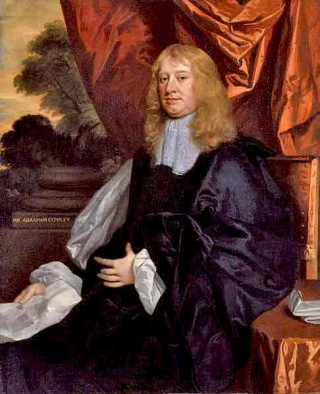Abraham Cowley in Jersey
Abraham Cowley painted by Sir Peter Lely
|
Books concerned with Jersey events during the 17th century and especially the Civil War, whether contemporary records such as Jean Chevalier's Journal, or historical studies such as those of S E Hoskins and A C Saunders, give detailed accounts of the visits paid here by Prince Charles and Lord Jermyn, but apparently fail to notice the presence among the English exiles who then came over from France of one of the foremost poets of the day, Abraham Cowley.
Nearly forgotten
Cowley is nearly forgotten now. His name lingers in some memories owing to his charming Essays, and one or two poems preserved in anthologies, but it is little more than a name to most people. Yet he once stood high in the estimate of English readers. He was celebrated as "incomparable Mr Cowley", "the great ornament of our nation". He could be compared to the best classical poets, and quite sincerely called "the English Ovid, Anacreon, Pindar and Virgil". We may be excused, therefore, for wishing to point out, more precisely than has yet been done, that this worthy paid at least two visits to this island during the Civil War.
True, he did not come here of his own free will, in search of inspiration, but in his capacity of secretary to Lord Jermyn. A staunch royalist, he had been expelled from Cambridge and was residing at Oxford, when he made the acquaintance of Jermyn, soon becoming his trusted companion and secretary. He followed him when he left for France, and for practically the whole of his exile he stayed with him and worked for him.
His main service consisted at first in ciphering and deciphering the letters exchanged between Charles I and his Queen (Jermyn being the Queen's own secretary and friend), and generally speaking he was in charge of an extensive correspondence, giving the latest information available in Paris to people of note such as Lord Culpeper, Edward Hyde, Sir John Berkeley, Henry Bennet, shortly to become the Earl of Arlington, and through him the Duke of York. Among these correspondents we find Sir George Carteret, which was only to be expected, since Jermyn was nominally Governor of Jersey.
Dangerous journeys
Cowley was, moreover, often compelled to leave the comparative security and comfort of Paris, and, in the words of his biographer Thomas Sprat, "he performed several dangerous journeys into Jersey, Scotland, Flanders, Holland, or wherever else the King's troubles required his attendance". Of his "dangerous journeys into Jersey" we have abundant proof.
When Lord Jermyn came over, in June 1646, bringing the Queen's orders to Prince Charles to leave Jersey and go to her, Cowley came with him. He is expressly named in the collective letter which the lords Capel and Hopton, Sir Edward Hyde, and Sir George Carteret wrote to denounce Jermyn's treasonable intention of selling Jersey and Guernsey to the French King for the sum of 200,000 pistols. "M Cowley", so they state, asked a gentleman here what the inhabitants of the island would think of such a process.
Again, when Jermyn came, in May and June 1651, to take the oath as Governor, with King Charles II's letters patent, Cowley accompanied him. But whereas Jermyn scorned to come to town and remained proudly drawn up in Elizabeth Castle, we may suppose that the secretary had dealings with the inhabitants of St Helier, and grew acquainted with them. Indeed, he was concerned with the sale of Crown lands about which Carteret felt so indignant, since he was to direct this sale, with Sir John Berkeley and receive the money: "The commission for the sale of the 200 pistols a year was to this effect, that the money whould be payd into the hands of M Cowley ... "; and Carteret, expressing as little liking and trust of the servant as of the master, adds: "and the two commissioners were to have a fleece out of it".
Letters and poems
He must have spent some time in the island, to transact this business. How long, we do not know. But long enough, at any rate, to have letters sent him here, and answer them, and we may guess at the feelings he experienced from one of these answers: a short poem entitled:
An answer to a copy of verses sent to me in Jersey
- As to a northern people (whom the sun
- Uses just as the Romish Church has done
- Her prophane Laity, and does assign
- Bread only both to serve for Bread and Wine)
- A rich Canary fleet welcome arrives;
- Such comfort to us here your letter gives,
- Fraught with brisk racy verses, in which we
- The soil from whence they came, tast, smell, and see:
- Such is your present to us; for you must know,
- Sir, that verse does not in this island grow
- No more than sack; one lately did not fear
- (Without the Muses leave) to plant it here.
- But it produced such base, rough, crabbed hedge
- Rhymes, as ev' en set the hearers ears on edge.
- Written by .... Esquire, the
- Year of our Lord six hundred thirty three.
- Brave Jersey Muse! and he's for this high stile
- Call'd to this day the Homer of the isle.
- Alas, to men here no words less hard be
- To rhime with, than Mount-Orgueil is to me.
- Mount-Orgueil, which in scorn o'th'Muses law
- With no yoke-fellow word will daign to draw ..
- Stubborn Mount-Orgueil! 'tis a work to make it
- Come into Rhyme, more hard than 'twere to take it.
- Alas, to bring your Tropes, and Figures here,
- Strange as to bring Camels and Ele'phants were.
- And Metaphor is so unknown a thing,
- "I would need I the Preface of, God save the King.
- Yet this I'll say for th'honor of the place,
- That by Gods extraordinary Grace
- (Which shows the people have judgment, if not wit)
- The land is undefil'd with Clinches yet.
- Which in my poor opinion, I confess,
- Is a most singular blessing, and no less
- Than Irelands wanting spiders. And so far
- From th' actual sin of Bombast too they are,
- (That other crying sin o'th'English Muse)
- That even Satan himself can accuse
- None here (no not so much as the Divines)
- For th'Motus primo primi to strong lines.
- Well, since the soil then does not naturally bear
- Verse, who (a devil) should import it here?
- For that to me would seem as strange a thing
- As who did first wild beasts into'islands bring.
- Unless you think that it might taken be
- As Green did Gondibert, in a prize at sea.
- But that's a Fortune falls not every day;
- 'Tis true Green was made by it; for they say
- The Parl'ament did a noble bounty do,
- And gave him the whole prize, their tenths and fifteens too.
(The anonymous" -- Esquire" is William Prynne)
Uncomplimentary lines
I am afraid these lines do not sound very complimentary. The poet seems to have missed in Jersey the graces and affectations of University and Court language to which he was accustomed, and of which, as may be seen here, he was such an adept. Apparently his surroundings were not congenial to him, and he felt doubly in exile, far from his conceited friends.
Of course, in this scorn of a "metaphysical poet" for plain-speaking, merely reasonable people, ignorant of "tropes, figures, and metaphors", there must be a good deal of rhetoric. He had to play the part of a citizen among boors. And as he wrote to a brother poet, we must make allowances. But one thing is surprising, and regrettable, considering that he was a poet: that he should have been blind - or at least mute - as to the exquisite natural beauty of the island. Let us charitably suppose that he was more of a politician's secretary than of a poet when he wrote these lines.


